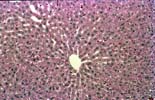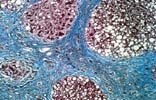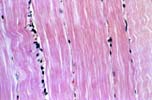Course Offerings
A unique environment for graduate training in pathobiology and translational science…



Course Offerings
This page provides a brief description of courses offered by the Pathobiology and Translational Science graduate program, and the faculty of the Department of Pathology and Laboratory Medicine. Courses that are infrequently offered are not listed. A complete listing of courses offered by the Department of Pathology and Laboratory medicine can be found in the Graduate School Record, under Pathology.
Courses for Graduate Students
PATH 713 Mechanisms of Disease (3 Hours)
A graduate course on cell injury and pathogenesis of disease with emphasis on basic mechanisms at the molecular, cellular, and organismal levels. Prerequisite: None. Three hours lecture and 2.5 hours laboratory each week. Offered Fall semester. Course Directors: J.W. Homeister jonathon_homeister@med.unc.edu
PATH 714 Mechanisms of Disease Laboratory (2 Hours)
A graduate laboratory course on cell injury and pathogenesis of disease featuring microscopic and gross pathology specimens. Prerequisite: Pathology 713. Can be taken concurrently with Pathology 713. Three hours laboratory each week. Offered Fall semester. Course Director: V.L. Godfrey virginia_godfrey@med.unc.edu
PATH 723 Practical Considerations for Translational Research (2 Hours)
Thisis a 2-hour course for biomedical science graduate students that are interested in translation of basic science into clinical practice, irrespective of primary discipline. This course will address (i) core competencies for translational researchers, (ii) fundamental molecular approaches that form the basis for translational science, (iii) fundamentals of personalized medicine, (iv) concepts related to team science, (v) commercialization of basic science, and (vi) industrial translational science. Offered Spring semester. Course Directors: E. Weimer eric.weimer@unchealth.unc.edu and K. Alby kevin_alby@unc.edu
PATH 725 Cancer Pathology (3 Hours)
This course will cover a range of topics including cancer etiology, mechanism, pathogenesis, hallmark and clinical features, and treatment. Lecturers will emphasize an interdisciplinary approach drawing on observations from epidemiology, genetics, molecular biology, animal modeling, histopathology and clinical medicine. The intent is to provide a firm foundation in pathobiologic features of cancer and thereby facilitate the translation of bench science into the clinical laboratory. Three lecture hours per week. Offered Fall semester. Course Director: A. Gladden agladden@email.unc.edu
PATH 766 Current Topics in Cardiovascular Biology (3 Hours)
This course emphasizes recent advances in heart and blood vessel development and the molecular mechanisms that regulate cardiovascular cell function. It is taught by UNC faculty of the McAllister Heart Institute and will stress primary literature and current methodologies. In general, course-work will consist of discussion and presentation of assigned manuscripts. Offered Fall semester. Course Director: Christopher Mack cmack@med.unc.edu
PATH 767 Molecular and Cellular Biology of Cardiovascular Disease (3 Hours)
This advanced course will explore the underlying pathogenesis of clinical cardiac and vascular disease with the objective of teaching students to understand, investigate, and communicate current concepts of cardiovascular disease. Study topics include hypertensions, lipid metabolism and atherosclerosis, metabolic syndrome, myocardial injury, heart failure, angiogenesis, thrombosis and thrombolysis, genetics and epidemiology of cardiovascular disease, and others. Offered Spring semester. Course Directors: J.W. Homeister jonathon_homeister@med.unc.edu
PATH 770 The Mouse Efficacy and Disease Models (3 Hours)
This course is designed for second to third-year students who intend on performing in vivo animal research. This course is intended to familiarize graduate students in the issues associated with the development and interpretation of mouse models and also an introduction to alternative models. Offered Spring semester. Course Director R. Sellers rsselle@unc.edu
PATH 801 Cell Cycle Regulation and Cancer (3 Hours)
A graduate-level course designed to teach the “scientific method” and based on student presentations of primary literature and group discussions. The primary goal is to teach students the process by which scientists identify problems, formulate testable hypotheses, collect data through experiments, and eventually establish new models describing biological processes. This course provides a structured mechanism to help facilitate the transition of students from the classroom to the lab and helps develop skills that will be required throughout their scientific careers. Offered Fall semester. Course Director: C. Vaziri cyrus_vaziri@med.unc.edu and J. Bowser jlbowser@email.unc.edu
PATH 850 Pathology Scientific Writing (1 Hour)
This course is designed for second to third-year students who have chosen their thesis lab. The students will develop a research plan based on their thesis project and write an 8-page grant in the style of an NRSA F31 application. Students will learn to edit and critique their fellow students’ proposals which will help prepare the students for writing and editing their preliminary exam and future grant applications. Offered Spring semester. Course Director: A. Gladden agladden@email.unc.edu
PATH 900 Research in Pathology (2-12 Hours)
This is a research course in which advanced students in pathology carry on investigations on mechanisms of disease. Six or more laboratory hours per week. May be repeated. Offered Fall and Spring semesters, and Summer sessions. Instructors: Staff.
PATH 994 Doctoral Dissertation (Hours/credits vary)
May be repeated. Offered Fall and Spring semesters, and Summer sessions. Instructors: Staff.